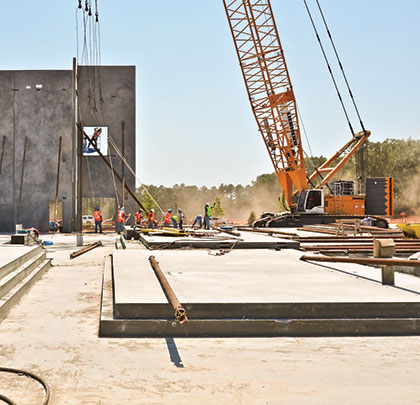Ed Sauter is the executive director of the Tilt-Up Concrete Association (TCA), a position he has held since 1992. Sauter is a registered architect and a partner in the management firm of Sauter Baty Associates and was CEO of a manufacturing company that produces products for the Tilt-Up industry prior to being named director of the TCA.
Ed Sauter is the executive director of the Tilt-Up Concrete Association (TCA), a position he has held since 1992. Sauter is a registered architect and a partner in the management firm of Sauter Baty Associates and was CEO of a manufacturing company that produces products for the Tilt-Up industry prior to being named director of the TCA.
The Tilt-Up Concrete Association officially launched the Company Certification program this March. The program was under development for more than 3 years in response to requests from the industry for more detailed assurance of company performance, as well as the ability to compete with other industries with broader oversight of products and companies. Applicants must provide documentation for a broad range of metrics, including project review, safety programs and records, quality control and assurance, certified personnel, continuing education, and a host of related criteria. An on-site audit of company and projects records, as well as personnel interviews, are conducted to confirm compliance.

Download the company certification program policies and procedures manual.
CERTIFICATION
Applicants can be certified at two levels: General Tilt-Up Contractor or Architectural Tilt-Up Contractor. To be certified as a General Tilt-Up Contractor, the applicant must have successfully completed 15 projects (or at least 10 projects totaling a minimum of 300 panels) in the past 5 years. In order to be certified as an Architectural Tilt-Up Contractor, the applicant must provide evidence of completed projects involving as least four different types of specialty finishes, which may include exposed aggregate, thin brick, curved panels, form liners, integral color, or extensive reveal patterns.
Safety programs and manuals are evaluated with regard to content, procedures for disciplinary and corrective actions. Training practices and frequency of safety meeting are also reviewed. Safety records and compliance with industry safety guidelines are considered in the approval process. The qualified or trained personnel section requires ACI Certified superintendents on every project, as well as evidence of the qualifications of pump and crane operators, rigging crews, and other key personnel on the project.
The Quality Control/Quality Assurance component is designed to ensure that the company has the procedures and policies in place that can produce consistent quality in Tilt-Up panel construction. Two projects are selected for which the applicant must provide full compliance with all documentation requirements from items, such as verification of layout and consideration of crane positioning and movement, to mill certification of reinforcement and adherence to break strengths of concrete cylinders for lifting and in-place loading. Shop drawings, panel books, and engineering seals are just some of the documents reviewed.

Companies are required to submit evidence of insurance coverage and a commitment to quality and references on completed projects to confirm compliance with projects to confirm compliance with project and industry specifications. The program outlines alternative requirements if certain jurisdictions have standards that differ from those found in the U.S. or for circumstances that may prohibit compliance with one or more of the requirements. The certification is valid for a period of 1 year. ■
For More Information:
TCA is a trade association representing contractors, professionals, and manufacturers in the Tilt-Up industry throughout the world. For more information on the certification program, contact the Tilt-Up Concrete Association (TCA) at 319.895.6911, or email Ed Sauter at esauter@tilt-up.org.
_________________________________________________________________________
Modern Contractor Solutions, June 2013
Did you enjoy this article?
Subscribe to the FREE Digital Edition of Modern Contractor Solutions magazine.

TCA Launches Company Certification Program


